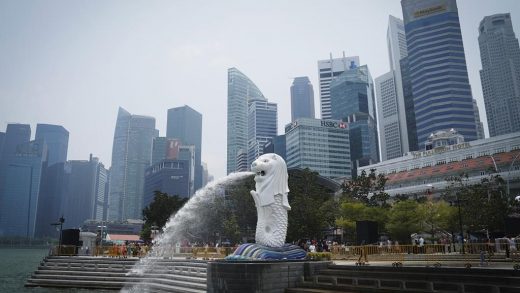
LAS VEGAS (AP) — The CEO of the Las Vegas Grand Prix was thrilled with Formula One’s first race on the famed Strip, but acknowledged Sunday there were missteps in the $500 million showcase event of the season.
Renee Wilm told The Associated Press first-time organizers F1 and owner Liberty Media worked tirelessly on a tight timeline of less than two years to prepare for Saturday night’s race. The weeklong event drew 315,000 spectators over four nights and brought in an estimated $1.2 billion in economic impact.
But Wilm acknowledged community relations could have been better to help local residents cope with the disruptions and road closures as the massive 3.85-mile (6.2 kilometer), 17-turn circuit was built. It was an enormous project that insiders believe caused Liberty to spend far more than the $500 million it was expected to cost to bring F1 back to Las Vegas for the first time since 1982.

“I think we could have done a much better job communicating, particularly with all the local residents,” Wilm told AP. “We were posting to the websites we were required to, but I just think we were moving so quickly that we internally did not have the right resources to say ‘In addition to that, we also need to be communicating in the following 10 ways.’
“We really were a startup with a very small team that was working in a very short amount of time.”
Aside from the disruptions for locals, businesses complained their traffic was down because customers could not access the establishments, and restaurants and nightclubs complained F1 threatened to erect structures to obscure any views if they didn’t pay exorbitant licensing fees.
The upside to the community is that F1 and Liberty used part of their funds to fully repave the Strip and circuit used — better roads for everyone once F1 is gone! — and multiple temporary pedestrian bridges were built for the event. Wilm said the state of Nevada is considering permanently keeping the the Flamingo pedestrian bridge because it was such a benefit to traffic planning.
She said more attention has to be given to transportation issues as the planning for 100,000 hotel rooms over the 3.85-mile circuit was the most daunting task of the event. The LVGP worked with the casinos, and federal and union laws surrounding work hours was part of the reason fans were forced to leave at 1:30 a.m. Friday morning before the start of second practice. A class-action lawsuit has been filed against the LVGP over Thursday night practice.
Wilm said the LVGP did not ask for a waiver on the live entertainment tax, a decision that allowed Nevada to receive “hundreds of millions of dollars in the coffers to use for teachers, for public safety, for STEM schools” she said. “We’re very happy to be able to use our event to help support community benefits.”
Now, what about the ticket pricing?
Average Americans complained from the beginning that they were outpriced, both by the tickets for the LVGP and the highly-jacked hotel rates. F1 eventually offered a lower-priced general admission ticket, but in the end, was not sold out Saturday nigh t and many hotels had dramatically reduced their rates.
The LVGP on Saturday opened up the deposit period for 2024 tickets with the lowest deposit $250 for one grandstand ticket all the way up to $5,000 for one ticket in private hospitality. Wilm said ticket pricing has not been set yet. So that $250 isn’t for a general admission seat — only a deposit to buy one later — and it isn’t refundable either.
She wouldn’t commit specifically to F1 and Liberty making changes to the pricing structure.
“I think we are going to take a look at a lot of things from year one and think about what we did well and what we can improve on next year,” she said. “I think we want to add more general admission ticketing. We want to be able to lean in more and look for ways to up the ante on the entertainment, while making sure it is a top notch sporting event.”
Wilm said the 10 p.m. local start for the Saturday night race fit with the Las Vegas social scene, which is used to having dinner then heading to a title fight within that same range. It wasn’t ideal timing for the United States audience, but it did benefit the Europeans who had the opportunity to awaken early Sunday and consume the race the way Americans do most weeks.
But she acknowledged that tinkering with practice and qualifying times could be explored ahead of next year’s race. The midnight Friday qualifying was at 3 a.m. on the East Coast and certainly not created for the American audience.
“Would we look to tweak the timing of some of the practice rounds or qualifying? Possibly,” she said. “It’s something we can think about. We’ll talk with the (F1) ecosystem about it. We’ll talk with our partners here in town. But our focus was really around that (race night) 10 p.m. start time here.”
When it was all said and done, and Max Verstappen won his 18th race of the season in what might have been F1’s most entertaining race of the year, any animosity over the race had blown up with the New Year’s Eve-style fireworks show that blanketed the strip. The missteps earlier in the week had been overshadowed by the racing itself, and even Verstappen, who had complained the LVGP was “ “99% show, and 1% sporting event” had become a convert.
He said he can’t wait for next year.
“I don’t think we could have done the Las Vegas Grand Prix, this type of spectacle, anywhere else in the world,” Wilm said. “When you think of the glamour and the high end hospitality offerings, the entertainment level, when we decided to bring this race to town, we wanted to accentuate those unique attributes of the valley and really highlight them while also putting together what we hoped would be just an epic sporting event as well.
“We are so thrilled with the final result. The response to Saturday night has been absolutely incredible.”
___
AP sports: https://apnews.com/sports


